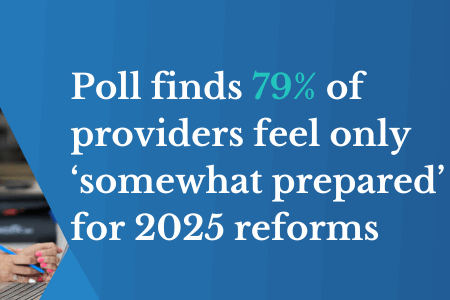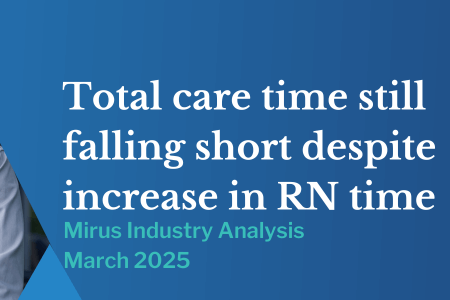The biggest aged care challenges in 2016
November 27, 2015 | Aged Care Management

As we’ve explored time and again, the lumbering giant that is the aged care sector continues to roll forward, picking up new residents as the population grows, and developing a host of challenges.
While 2015 has seen much improvement in how we’re dealing with these issues as a country – for example the recent introduction of the Severe Behaviour Response teams – the laundry list continues to add up. With 2016 just around the corner, now is the perfect time to stop and reassess the key challenges for the year ahead.
This article will take look at the challenges of 2015, how we can continue to develop a strong carer network into next year, the need to develop ties with other countries and ongoing financial sustainability in facilities.
 2016 is just around the corner.
2016 is just around the corner.The stand-outs of 2015
This year has seen a number of important changes and developments. Take for example the Free Trade Agreement between China and Australia, a development which will certainly prove a focal point over the next few years as collaboration between the two countries increases.
Or, the announcement from Leading Age Services Australia that shows 23.6 per cent of the elderly Victorian population live in inner regional areas. This statistic points to a strong need to make care options accessible across the country.
There was also the announcement from Western Australia Mental Health Minister Helen Morton, in which she stressed the importance of building better mental health system.
“Being active, having a sense of belonging and a sense of purpose in life all contribute to happiness and good mental health,” she explained.
Similar individuals and industry bodies have come forward throughout the year to discuss the importance of creating a more sustainable aged care sector.
So, with 2015 still fresh in our minds, what are some of the biggest challenges looming on the horizon for 2016?
1) Creating a capable carer network
In a recent Roy Morgan Research survey, nurses ranked highly among other professions for ethics and honesty – above doctors and even school teachers. In fact, 92 per cent of the surveyed Australians over the age of 14 rated nurses as the most ethical and honest profession.
It’s certainly an interesting statistic, but it’s not hard to see why nurses come in near the top. These are the professionals with whom we trust the care of our loved ones as they get older, and when they’re in medical facilities.
In 2016, it’s going to be critical that we continue to develop a leading carer network Down Under, to meet the demands of the expanding number of residents.
A 2012 release from the Australian Bureau of Statistics noted that around 2.7 million Australians were carers, accounting a for a substantial 12 per cent of the total population. Next year, it’s going to be important that support networks are in place for these people and the experienced professionals working within aged care facilities.
2) Developing stronger international relationships
Over the past few decades, the barriers between many countries have started to fade, thanks largely to the proliferation of the internet and easier transport by way of air travel. This has meant knowledge sharing on a massive scale is now far easier.
Over the past few decades, the barriers between many countries have started to collapse.
In a similar vein, free trade agreements allow countries to more easily collaborate across industries, whether related to sectors like energy or even aged care. Thanks to the announcement of the Free Trade Agreement between China and Australia, and the strengthening relations as a result, 2016 has now become a year of possibility for aged care.
Of course, there’s the clear opportunity for aged care providers in Australia, as it’s going to be far easier to open operations in China and start providing care for the massive population of elderly. In addition, providers in both countries will find it easier to open the lines of communication and develop sustainable industries in both countries.
As with nearly every country across the globe, China and Australia are both dealing with not only growing populations, but growing elderly populations. Stronger collaboration will prove essential.
“Australian operators have the expertise to assist with the design and construction of aged care homes and retirement villages, train staff and ultimately manage and operate the facilities,” a release from Corrs Chambers Westgarth noted.
3) Financial sustainability
While there are a number of challenges in aged care, especially as the sector continues to grow into 2016, there’s one that stands out as a stickler for many aged care providers: financial sustainability.
It’s no secret that aged care facilities can be significantly costly to run, especially with residents requiring quite a substantial array of care options. Those with dementia and other illnesses can often require higher levels of specialist care, which in turn means the facility has to provide additional equipment and in some cases specialised training.
What’s more, there’s a high chance that patients are going to continue to demand variation when it comes to care, which means providers will need to scale up options throughout the year.
Ongoing financial sustainability is certainly one of the more important issues in aged care, and it could bloom into a significant problem if providers don’t take the necessary action now. As the year ticks over, this is one area providers will need to focus on.
Conclusion
Winding up this year and heading into 2016, it’s clear that the aged care sector still has much room for improvement ahead of further growth. After all, with McCrindle Research finding that both the population of elderly and the population at large will continue to expand at a rapid pace over the coming decades, focus now will have significant payoffs.
To learn more about the range of tools and services available for aged care providers, and more information about the changing state of Australian aged care, don’t hesitate to reach out to Mirus Australia. Aged care is certainly going to see significant developments throughout 2016.


